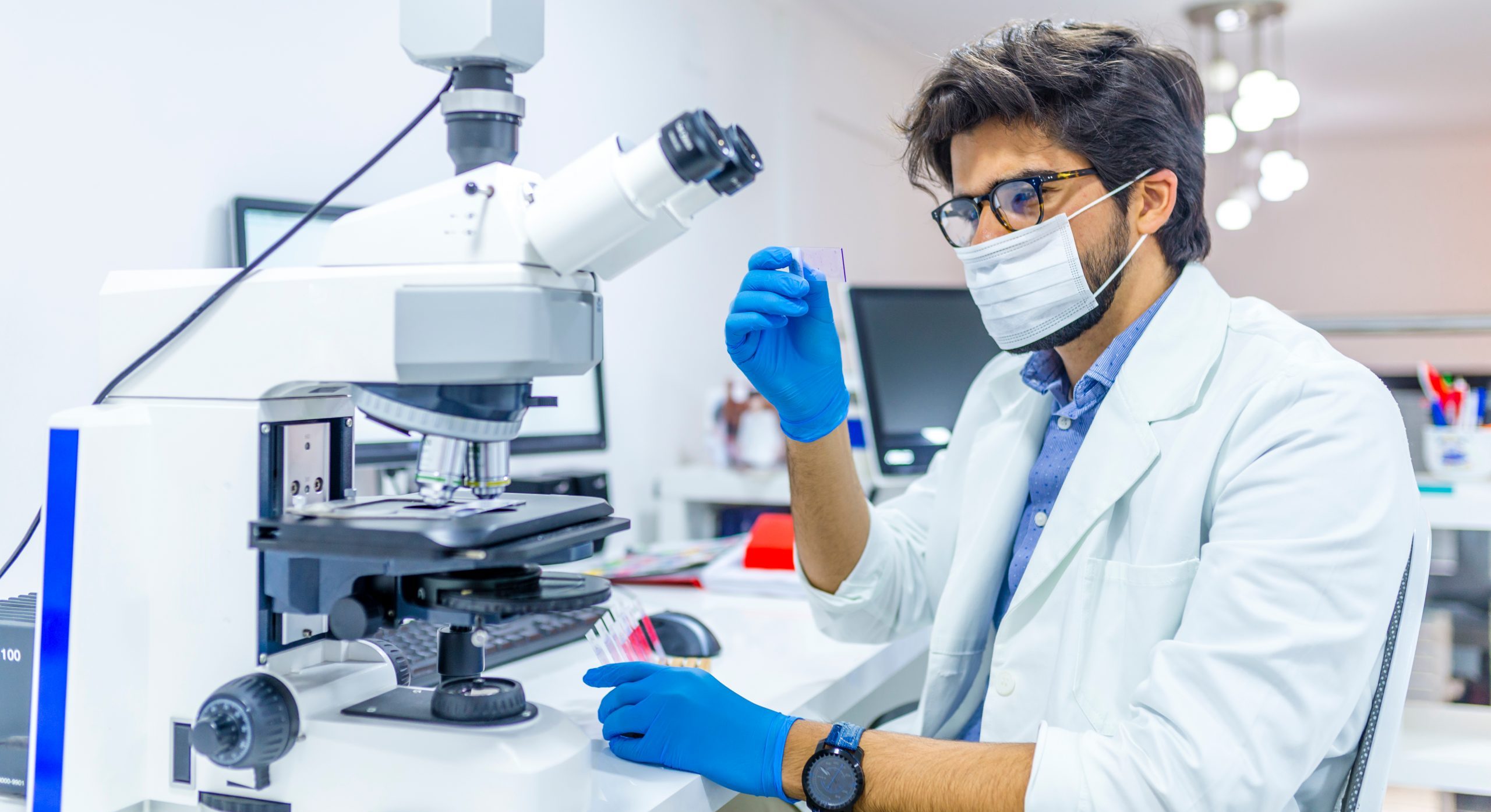Several teams of researchers are working tirelessly on COVID-19 at the Armand-Frappier Santé Biotechnologie Research Center.

COVID-19 : Three research themes
The Foundation proudly supports researchers who, by pooling their fields of expertise, unite for the development of research surrounding COVID-19. Three main research themes are currently put forward thanks to research done by sixteen teams at the Armand-Frappier Santé Biotechnologie Research Center: vaccine development, drug development and virus detection.
Here is an overview of the research currently underway at the Armand-Frappier Santé Biotechnologie Research Center.
THE DEVELOPMENT OF A VACCINE

Pr Albert Descoteaux
Evaluation of an exosome-based vaccine against SARS-CoV-2
This project aims to evaluate the efficacy of a novel platform to develop a vaccine against the SARS-CoV-2. This vaccine is based on exosomes (or extracellular vesicles) produced by a strain of Leishmania genetically engineered to produce the Spike protein of the virus. The vaccine platform will take advantage of the high immunogenic potential of Leishmania exosomes.

Pr Nicolas Doucet
Validating the efficiency of a semi-synthetic vaccine against the SARS-CoV-2 coronavirus to help alleviate the current worldwide COVID-19 pandemic
In partnership with Glycovax Pharma, we evaluate the feasibility of a vaccine strategy targeting carbohydrate molecules located on the surface of the S protein, which allows the coronavirus to infect human cells. These carbohydrates are the same as those found on other proteins in the body, so the immune system may not recognize the coronavirus as an invading pathogen. The process by which carbohydrates are attached to the surface of proteins can thus serve as a camouflage for the virus. However, certain types of carbohydrates, scarcely found on other human proteins, could be a promising target for a vaccine.
DRUG AND TREATMENT DEVELOPMENT
 Pr Charles Gauthier
Pr Charles Gauthier
Red berries from Quebec’s boreal forest as potential anti-coronavirus agents
Natural phenolic compounds have shown promising as antiviral agents against SARS-CoV-1 as well as against other emerging viruses (MERS-CoV, Zika, Ebola). These molecules are not toxic and some have already been approved by the FDA as food supplements. In addition, quercetin, a naturally occurring polyphenol, is currently being evaluated clinically against SARS-CoV-2. We propose to study the anti-coronavirus activity of natural polyphenols as well as extracts of red fruits from the Quebec boreal forest enriched in phenolic compounds. This project has the potential to generate new natural compounds as effective, stable, non-toxic and orally administrable anti-coronavirus agents.
 Pr Steven Laplante
Pr Steven Laplante
Urgent Discovery of Drug Candidates That Target COVID-19 Coronavirus SARS-Cov2
Our goal is to rapidly provide drug candidates to treat victims of COVID-19. We will do this by applying our cutting-edge technologies and libraries to screen for viable active compounds that kill coronavirus. The strategy will employ phenotype screens that will serve as fast tests for coronavirus inhibition in cell culture. Direct-acting antiviral drugs will also be sought via screens that target essential virus proteins and viral entry.

Pr Charles Ramassamy
Inhibition of TMPRSS2 and 3CL Proteases by natural polyphenols to prevent SARS-CoV-2 infectivity and replication
To infect a cell, the virus SARS-CoV-2 has to be introduced in the host cells by binding to its specific targets. Once inside the cells, the virus has to use the cellular machinery to replicate and to propagate. The aim of our work is to identify the potential drugs which could prevent the fixation of the virus to its cellular target and to prevent its replication once it is inside the cells. For this, we use a multidisciplinary approach. As we are working on natural compounds, they could be rapidly approved for the treatment against SARS-CoV-2 if they are efficient.
 Pr Laurent Chatel-Chaix
Pr Laurent Chatel-Chaix
Development of inhibitors against SARS-CoV-2 and identification of novel therapeutic targets
There are currently no available antiviral therapies which efficiently and directly target SARS-CoV-2, the causative agent of COVID-19. To face this public health challenge, we are aiming to identify compounds that inhibit the replication of this pathogen by testing thousands of molecules coming from several internal and external sources.
Moreover, to identify novel therapeutic targets, we are studying at the molecular level how SARS-CoV-2 co-opts the cellular machineries to optimize its replication inside infected cells. This project benefits from the soon-to-be-certified bio-safety level 3 laboratory of AFSB, which is supervised by Laurent Chatel-Chaix and absolutely required to study this virus in native infectious conditions.
VIRUS DETECTION AND TARGETED SARS-COV-2 RESEARCH
 Pr Jonathan Perreault
Pr Jonathan Perreault
Sensitive and specific electrochemical detection of COVID-19 (SARS-CoV-2) based on isothermal amplification
New, simpler and faster approaches to detect the coronavirus causing COVID-19 could be a game-changer. To this end, we are working to develop a technology that will allow such detection with a small, easy-to-operate portable device, without the need to transport samples to a specialized laboratory. Like the methods currently used, our approach is also based on the recognition of the precise sequence of the genetic material of the virus, but does not require sophisticated equipment and will use an electrode as a signal detector, allowing, in the long term, to adapt it to a smart phone for example.
 Pr Marie-Élise Parent
Pr Marie-Élise Parent
Pr Marie-Claude Rousseau
Case-control study on a potential protective effect of BCG vaccination against SARS-CoV-2 virus
Our goal is to determine whether having received the vaccine used to prevent tuberculosis (BCG vaccine) in childhood protects against infection with the virus that causes COVID-19. We will document the vaccination status among 900 people who have tested positive for COVID-19 and 2,700 people who did not have the disease. Our analyses will determine if the risk of developing COVID-19 is reduced among people vaccinated with BCG in childhood. The demonstration of a protection by the BCG vaccine, known to be safe, could contribute to our fight against the COVID-19 pandemic with a readily available vaccine.
 Pr Frédéric Veyrier
Pr Frédéric Veyrier
Oro- and nasopharyngeal bacterial community markers to predict COVID-19 complications
We will study and compare the genome of the virus and the composition of the bacterial population present in the pharynx at the onset of infection to determine whether the composition of the microbiota or certain polymorphisms of the virus (changes in the viral RNA sequence) can influence the clinical development of COVID-19 including its severity. In addition, we will follow, in certain patients admitted to intensive care, the evolution of this ecosystem and of the virus to determine if certain bacteria benefit from the viral infection and / or if the virus undergoes an adaptation during the infection in some people. These researches could lead to a better understanding of this disease and above all, to possible treatment options to reduce the severity of complications.
Expertise mobilized in three research themes to fight Covid-19

Pr Alain Lamarre
Animal models of COVID-19 for developing vaccines and treatments
The development of representative animal models of COVID-19 is essential for developing new diagnostic, prophylactic and therapeutic approaches against the SARS-CoV-2 coronavirus. These can also be used to better understand the pathological mechanisms of infection. Several animal models will be developed according to the various needs of the scientific community of the Center and the region. The expertise developed will allow us to better define the parameters of immunity that lead to protection against infection and will be made available to our academic and industrial colleagues according to their needs in the development of new treatments and vaccines.
 Pr Pierre Talbot
Pr Pierre Talbot
Specialist in Coronavirus research
A seasoned researcher specializing in Coronavirus research for nearly 40 years, Professor Pierre Talbot acts as a mentor and advisor to several of the above teams. His research targets coronavirus, a widespread virus that causes one-third of colds and a variant of which caused SARS, the first infectious pandemic in the 21st century, MERS, a Middle Eastern respiratory syndrome, and COVID-19, responsible for the current global pandemic.
Help us support these pioneers of public health research in Quebec!
Read the media coverage:
- Deux chercheurs de l’INRS s’impliquent dans le processus de création d’un vaccin
- Des composants de fruits et légumes pour freiner le coronavirus?
- Des patients ont-ils réellement rattrapé la COVID-19 en Corée?
- Des recherches pour un antiviral à large spectre contre les coronavirus
- Detecting the COVID-19 virus in the field
- Développement d’un vaccin: une véritable course contre la montre
- Doit-on craindre une mutation de la COVID-19?
- Est-ce sécuritaire de faire du covoiturage?
- Les origines du coronavirus
- Les recherches pour un antiviral à large spectre contre les coronavirus
- L’INRS collabore à un projet de vaccin contre le coronavirus
- L’INRS investit 1 M $ dans la recherche sur la COVID-19 pour répondre aux besoins criants de la société
- «On n’est pas sortis du bois»
- Two INRS researchers involved in the process of creating a vaccine against COVID-19
- Vaccin anti COVID-19: L’INRS arrive en renfor
- Vaccins : à quoi s’attendre ?


